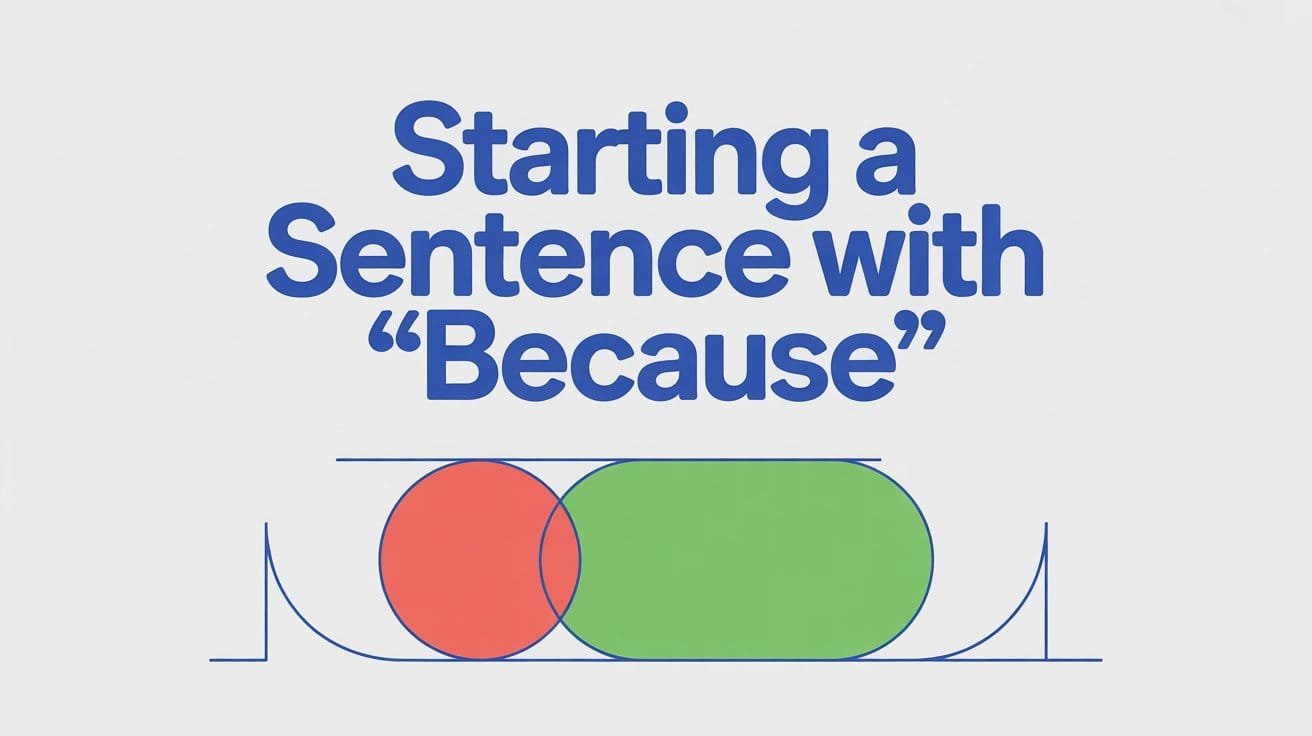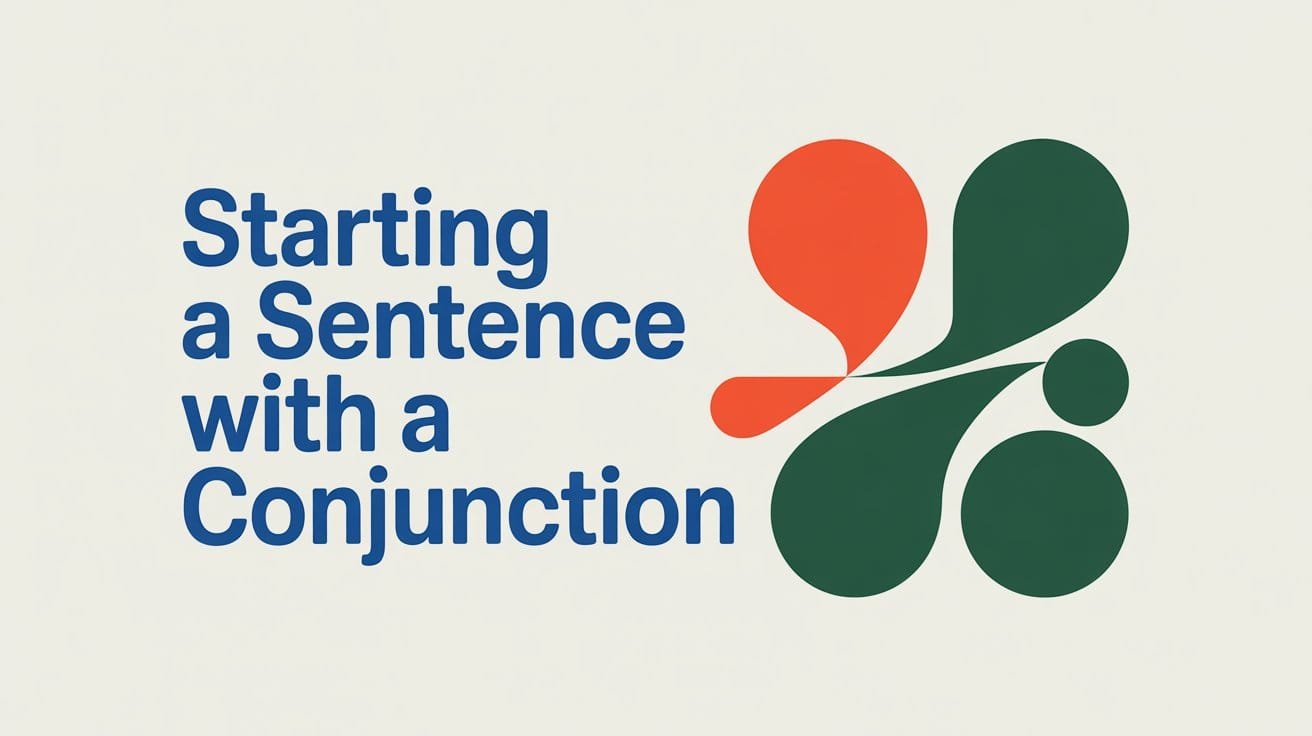Yes, you can start a sentence with because, as long as the sentence is complete. This word is a subordinating conjunction, which means it connects a dependent clause to a main (independent) clause. Problems only arise when the thought is left unfinished.
The idea that you should never begin a sentence with because is a common myth. It’s usually taught to help students avoid sentence fragments—but when used properly, because can absolutely appear at the start of a sentence.
When Is It Correct to Start a Sentence with Because?
It’s correct to start a sentence with because when you’re introducing a reason—and the sentence includes both the dependent clause and the main clause.
Because introduces a dependent clause, which means it can’t stand alone. It needs to be followed (or preceded) by an independent clause to form a complete thought.
✅ Because it was raining, we stayed indoors.
✅ We stayed indoors because it was raining.
In both cases, the sentence is complete. The reason (because it was raining) is clearly connected to the main idea (we stayed indoors).
Starting with because is especially useful when you want to emphasize the reason before the result. It also adds variety to your sentence structure.
Examples of Sentences Starting with Because
Each sentence below begins with a because-clause (the reason) and is completed by a main clause (the result or outcome). This structure is grammatically correct and adds clarity to your writing.
- Because the roads were blocked, the delivery arrived late.
- Because the experiment lacked proper controls, the results were considered unreliable.
- Because traffic was unusually light, we arrived ahead of schedule.
- Because he explained the concept step by step, everyone in the class understood it clearly.
- Because her application highlighted relevant experience, she was shortlisted immediately for the interview.
When to Avoid Starting a Sentence with Because
Starting a sentence with because is fine—if the sentence is complete. Problems usually happen when the sentence is cut off too early or leaves the reader expecting more. Here’s when you should avoid starting with because:
1. When the Sentence Is Incomplete
Because introduces a dependent clause, so it can’t stand alone.
❌ Because it was raining.
✅ Because it was raining, we stayed inside.
The first version leaves the reader hanging. It tells us why, but not what happened.
2. When It Creates Sentence Fragments in Formal Writing
Fragments are often seen in casual speech or dialogue, but they may not be appropriate in formal writing.
❌ Because he missed the deadline.
✅ He lost points because he missed the deadline.
Or if you want to start with because:
✅ Because he missed the deadline, he lost points.
3. When It’s Overused in Back-to-Back Sentences
Starting multiple sentences with because can make your writing sound repetitive or overly structured. You should combine ideas when it makes sense, and vary your sentence openings.
❌ Because it was late, we left. Because we were tired, we didn’t go out again.
✅ Because it was late and we were tired, we decided not to go out again.
How to Use Because at the Beginning of a Sentence
Using because at the beginning of a sentence is useful when you want to explain a reason first, but the sentence still needs to be complete and clear. Here’s how to do it correctly:
Always Pair the Because-Clause with a Main Clause
A sentence that starts with because must include two parts:
- a dependent clause (the reason)
- an independent clause (the result)
✅ Because the internet was down, the meeting was delayed.
✅ Because she arrived early, she got a good seat.
Each sentence begins with a reason and follows it with what happened as a result. Without both parts, the sentence is incomplete.
Use Because to Emphasize the Reason First
Placing because at the start of a sentence allows you to focus on the cause before revealing the effect. This can be helpful for adding variety and emphasis.
✅ Because it was his birthday, he brought cake for everyone.
✅ Because the instructions were unclear, the task took longer than expected.
If you reversed the sentence, it would still be correct—but the focus would shift.
Watch Your Punctuation
When a sentence starts with because, you usually need a comma to separate the clauses.
✅ Because the road was closed, we took a different route.
But when because comes in the middle of the sentence, a comma is not needed:
✅ We took a different route because the road was closed.
Related Reading
- Can You Start a Sentence with Can?
- Can You Start a Sentence with But?
- Can You Start a Sentence with Although?
- Can You Start a Sentence with Or?
Final Thoughts
Yes, you can start a sentence with because—as long as the sentence is complete. It’s a natural way to introduce a reason and is commonly used in both speech and writing.
The key is to avoid fragments. Always pair the because clause with the main clause so the sentence makes sense on its own. Whether you’re writing informally or professionally, starting with because can add emphasis, variety, and clarity to your writing when used correctly.



